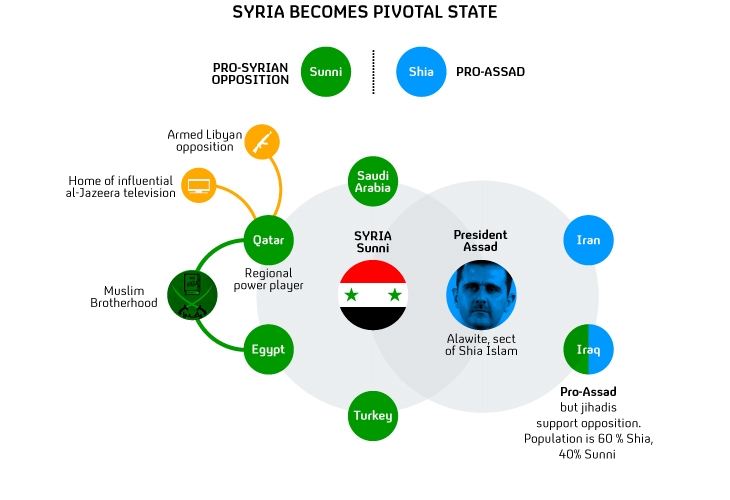Turkey and Syria: More than a neighbourhood row
As Turkey’s retaliation to Syria’s mortar attack on a Turkish town marks a new low in relations between the neighbouring countries, Channel 4 News looks into the background of the latest skirmishes.
The Syrian Observatory for Human Rights said a number of President Bashar al-Assad’s soldiers were killed in the artillery attacks overnight.
Five Turkish civilians died in the mortar attack on the Turkish town of Akcale, on the Syrian border.
An aide to the Turkish prime minister said the shelling of the Syrian town was a “warning”.
There are reports that Russia is encouraging the two countries to resolve their border disputes, with Foreign Minister Sergei Lavrov urging Syria to clarify that its mortar attack was “an accident”.
“Turkey has no interest in a war with Syria. But Turkey is capable of protecting its borders and will retaliate when necessary,” Ibrahim Kalin, a senior adviser to Prime Minister Tayyip Erdogan, said on his Twitter account.
“Political, diplomatic initiatives will continue,” he said.
Troops increase
Turkey is also reported to be increasing the number of troops along its border.
But Turkey’s military response to this attack contrasted with its relative restraint when Syria shot down a Turkish reconnaissance jet in June.
President Erdogan then told the country’s parliament that Turkey would consider any Ankara’s rational response to Syria’s shooting down of a Turkish warplane should not be mistaken for weakness, warning Turkey’s wrath was as strong as its friendship was valuable.
Ankara then increased its military presence along its 560-mile border with Syria and called a meeting of Nato’s North Atlantic Council.
That meeting was only the second time in Nato’s 63-year history that members had convened under article four of its charter, which provides for consultations when a member state feels its territorial integrity, political independence or security is under threat.
The same article was invoked for the meeting of Nato ambassadors in Brussels late on Wednesday, after which they said the shelling “constitutes a cause of greatest concern for, and is strongly condemned by, all allies”.
‘Terrorist state’
President Erdogan had long cultivated good relations with Syrian president Bashar al-Assad, but he became a harsh critic after Syria’s popular revolt began last year, accusing him of creating a “terrorist state”.
Turkey has since become one of the main destinations for refugees fleeing the violence in Syria. Based on figures from the Turkish, the number of Syrian refugees registered and assisted by the government in camps was 93,576 as of 1 October.
Several thousand more are known to be residing outside the current 13 camps with three more camps scheduled to open. The UNHCR has estimated that Turkey could be hosting up to 280,000 Syrian refugees by the end of this year.
But some of Syria’s cross-border shelling could be explained by the Assad regime’s anger at Erdogan, who has allowed Syrian rebels to organise on Turkish soil and pushed for a foreign-protected safe zone inside Syria.
On Monday, Syria’s foreign minister accused Turkey, the United States, France, Saudi Arabia and Qatar of arming and funding rebels intent on toppling Assad, a charge Ankara has repeatedly denied.
Another factor is an increase in attacks by the Kurdish Workers’ Party (PKK) inside Turkey, which has attacked Turkish military patrols and taken control of several dozen villages on the Turkish side of the border. Turkish commentators blame Syria and Iran for the incidents.

But there are more long-standing explainations for the unease between the two Middle Eastern nations whose ruling elite are on opposite sides of the Sunni – Shi’ite sectarian divide.
The conflict, which is thought to have claimed 30,000 lives across Syria, has growing sectarian overtones which threatens to draw in regional Sunni Muslim powers like Turkey and countries ruled by the Shi’ite community, which the Assad regime belong to.
Turkey is in a strong position in terms of allies with regional powers including Qatar backing its stance, along with Nato and EU allies who have condemned Syrian attack on Turkey.
Washington sees Turkey as a pivotal player in backing Syria’s opposition and planning for the post-Assad era. The White House said on Wednesday it stood by “our Turkish ally”.
But Ankara has found itself increasingly isolated and frustrated by a lack of international consensus on how to end the conflict.